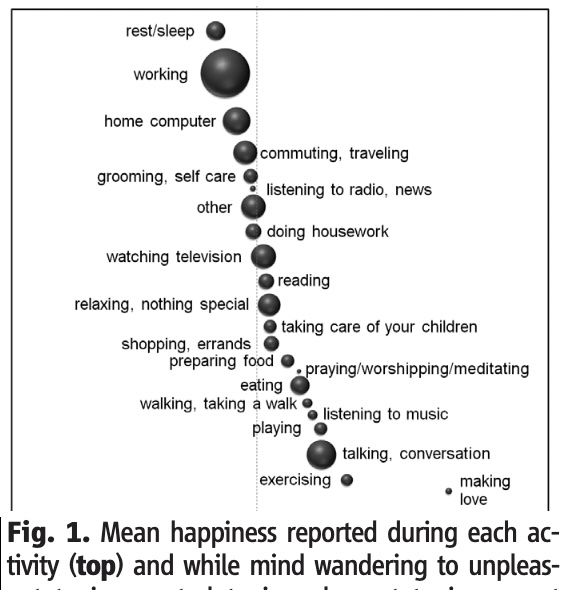Harvard researchers pinged 2,250 people randomly throughout the day to ask 3 simple things:
—What are you doing?
—Are you paying attention?
—How do you feel?
The result? Nearly half the time (46.9%), people weren’t focused on what they were doing.
And the more their minds wandered, the worse they felt.
The key to happiness? Presence...regardless of what you are doing.
—What are you doing?
—Are you paying attention?
—How do you feel?
The result? Nearly half the time (46.9%), people weren’t focused on what they were doing.
And the more their minds wandered, the worse they felt.
The key to happiness? Presence...regardless of what you are doing.
Even when minds drifted to pleasant thoughts, people were no happier than when they focused on the present.
When minds wandered to neutral or negative things, happiness plummeted.
So yes, even daydreaming about your next vacation makes you feel worse than doing the dishes, if you’re actually present for the dishes.
It’s not about what you’re doing.
It’s about whether you're fully there.
When minds wandered to neutral or negative things, happiness plummeted.
So yes, even daydreaming about your next vacation makes you feel worse than doing the dishes, if you’re actually present for the dishes.
It’s not about what you’re doing.
It’s about whether you're fully there.

You can’t out-plan or out-visualize your way to happiness.
It’s tempting to think that if we just imagine better futures, we’ll feel better now.
But that’s not how the brain works.
Our minds evolved to wander for survival, not fulfillment.
The challenge today is not escaping the moment—but learning to stay.
It’s tempting to think that if we just imagine better futures, we’ll feel better now.
But that’s not how the brain works.
Our minds evolved to wander for survival, not fulfillment.
The challenge today is not escaping the moment—but learning to stay.
Why is this so hard?
Because your brain treats planning and worrying the same way, it mistakes thought for control.
It thinks: if I can mentally rehearse every scenario, I’ll be prepared.
But that mental rehearsal comes at an emotional cost.
It pulls us out of the now and into the storm.
Because your brain treats planning and worrying the same way, it mistakes thought for control.
It thinks: if I can mentally rehearse every scenario, I’ll be prepared.
But that mental rehearsal comes at an emotional cost.
It pulls us out of the now and into the storm.
What’s the antidote?
Train your attention like an athlete trains their body.
Attention is not about rigid focus, it’s about being where your feet are.
Instead of chasing the next thought, come back to your breath.
Back to the walk, the run, the task in front of you.
Train your attention like an athlete trains their body.
Attention is not about rigid focus, it’s about being where your feet are.
Instead of chasing the next thought, come back to your breath.
Back to the walk, the run, the task in front of you.
This isn’t about pretending life is always good.
It’s about choosing presence even when it’s uncomfortable.
Because when we run from reality, we miss the beauty and the pain, and both are part of a full life.
You can’t numb the bad without numbing the good.
Being present is how you stay alive to it all.
It’s about choosing presence even when it’s uncomfortable.
Because when we run from reality, we miss the beauty and the pain, and both are part of a full life.
You can’t numb the bad without numbing the good.
Being present is how you stay alive to it all.
If you want to be happier, don’t try to control every outcome.
Try to control where your attention goes.
The moments when you feel most alive—conversation, playing, exercising—have one thing in common:
You’re completely there.
No past. No future. Just now.
Try to control where your attention goes.
The moments when you feel most alive—conversation, playing, exercising—have one thing in common:
You’re completely there.
No past. No future. Just now.
The modern world trains us to fragment our attention.
Notifications, multitasking, background noise.
But the science is clear: "a wandering mind is an unhappy mind."
Don’t just train your body. Train your mind to stay.
Happiness isn’t somewhere out there, it’s right here, if you let it be.
Notifications, multitasking, background noise.
But the science is clear: "a wandering mind is an unhappy mind."
Don’t just train your body. Train your mind to stay.
Happiness isn’t somewhere out there, it’s right here, if you let it be.
"A human mind is a wandering mind, and a wandering mind is an unhappy mind. The ability to think about what is not happening is a cognitive achievement that comes at an emotional cost."
Killingsworth & Gilbert (2010), Science.
Killingsworth & Gilbert (2010), Science.

• • •
Missing some Tweet in this thread? You can try to
force a refresh





